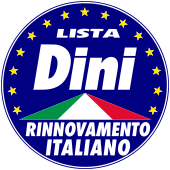Italian Renewal (Italian: Rinnovamento Italiano, RI) was a centrist[4] and liberal[5][6] political party in Italy.
Italian Renewal Rinnovamento Italiano | |
|---|---|
 | |
| Leader | Lamberto Dini |
| Founded | 27 February 1996 |
| Dissolved | 17 March 2002 |
| Merged into | Democracy is Freedom – The Daisy |
| Headquarters | Via di Ripetta, 142 - 00186 Rome |
| Ideology | Liberalism Pro-Europeanism |
| Political position | Centre |
| National affiliation | The Olive Tree |
| European affiliation | European People's Party[1][2] |
| European Parliament group | EPP-ED[3] |
The party was a member of The Olive Tree[4] and centre-left coalition,[7] while also affiliated to the European People's Party from 1998 to 2004.[8]
History
editOriginally the Dini List – Italian Renewal (Lista Dini – Rinnovamento Italiano),[9] the party was founded in 1996 by Lamberto Dini,[10] the outgoing Prime Minister, along with former Christian Democrats, Liberals, Socialists, Republicans and Social Democrats. The party joined The Olive Tree centre-left coalition led by Romano Prodi. In the 1996 Italian general election, RI gave hospitality in its electoral lists to the Italian Socialists (SI), the Segni Pact (PS) and the Democratic Italian Movement (MID).[11] The Dini List won 4.3% of the vote, winning 26 seats at the Chamber:
- 10 Diniani (Dini, Augusto Fantozzi, Tiziano Treu, Natale D'Amico, Ernesto Stajano, Gianni Marongiu, Pierluigi Petrini, Andrea Guarino, Paolo Ricciotti, Lucio Testa);
- 8 PS (Diego Masi, Giuseppe Bicocchi, Elisa Pozza Tasca, Gianni Rivera, Antonino Mangiacavallo, Gianantonio Mazzocchin, Bonaventura Lamacchia, Paolo Manca);
- 7 SI (Enrico Boselli, Giuseppe Albertini, Enzo Ceremigna, Giovanni Crema, Leone Delfino, Sergio Fumagalli, Roberto Villetti);
- 1 MID (Aldo Brancati).
The list also won 11 seats at the Senate:
- 5 SI (Ottaviano Del Turco, Livio Besso Cordero, Giovanni Iuliano, Maria Rosaria Manieri, Cesare Marini);
- 4 Diniani (Mario D'Urso, Bianca Maria Fiorillo, Angelo Giorgianni, Adriano Ossicini);
- 1 PS (Carla Mazzuca Poggiolini);
- 1 MID (Giovanni Bruni).
After the election Dini became Minister of Foreign Affairs and Treu minister of Labour in the Prodi I Cabinet.[5]
In 1998 the party was admitted into the European People's Party and at the 1999 obtained 1.1% of the vote and one MEP, Pino Pisicchio.
In October 2001 the party joined the Democracy is Freedom – The Daisy (DL), an electoral alliance of centrist parties which merged to become a unified party in March 2002. RI members in DL formed a faction within the party, named simply Renewal, consisting of around 10% of the party members. In 2007 several members of this association including Dini broke away from to form the Liberal Democrats upon DL's merger with the Democrats of the Left to form the Democratic Party.
Electoral results
editItalian Parliament
edit| Chamber of Deputies | |||||
| Election year | Votes | % | Seats | +/− | Leader |
|---|---|---|---|---|---|
| 1996 | 1,627,380 (8th) | 4.3 | 36 / 630
|
–
|
|
| Senate of the Republic | |||||
| Election year | Votes | % | Seats | +/− | Leader |
|---|---|---|---|---|---|
| 1996 | with Ulivo | –
|
11 / 315
|
–
|
|
European Parliament
edit| European Parliament | |||||
| Election year | Votes | % | Seats | +/− | Leader |
|---|---|---|---|---|---|
| 1999 | 353,890 (16th) | 1.1 | 1 / 87
|
–
|
|
Symbols
edit-
1996–1999
-
1999–2001
-
2001–2002
References
edit- ^ Daniela Giannetti and Kenneth Benoit (edited by), Intra-party Politics and Coalition Governments, Routledge, Oxon 2008
- ^ "Rinnovamento italiano ammesso nel Ppe". Archiviostorico.corriere.it. Retrieved 2014-07-18.
- ^ "Parlement Européen 1999". Europe-politique.eu. Retrieved 2014-07-18.
- ^ a b Jonathan Hopkin; Piero Ignazi (2008). "New Governing Parties in Italy". In Kris Deschouwer (ed.). New Parties in Government: In Power for the First Time. Routledge. p. 48. ISBN 978-1-134-13640-7.
- ^ a b Gino Moliterno, ed. (2002). Encyclopedia of Contemporary Italian Culture. Routledge. p. 252. ISBN 978-1-134-75876-0.
- ^ Maurizio Cotta; Luca Verzichelli (2007). Political Institutions of Italy. Oxford University Press. p. 39. ISBN 978-0-19-928470-2. Retrieved 24 August 2012.
- ^ Guido Ortona; Stefania Ottone; Ferruccio Ponzano (2007). "A Simulative Assessment of the Italian Electoral System". In Fabio Padovano; Roberto Ricciuti (eds.). Italian Institutional Reforms: A Public Choice Perspective. Springer. p. 35. ISBN 978-0-38-772141-5.
- ^ Thomas Jansen; Steven Van Hecke (2011). At Europe's Service: The Origins and Evolution of the European People's Party. Springer Science & Business Media. p. 51. ISBN 978-3-642-19414-6.
- ^ Daniele Caramani (2017). Elections in Western Europe 1815-1996. Springer. p. 622. ISBN 978-1-34-965508-3.
- ^ Alan Friedman (27 February 1996). "Berlusconi Looks Like the Loser in Dini's Jump into Politics". The New York Times. Paris. Retrieved 30 November 2013.
- ^ James J. Newell; Martin Bull (2014). "Party Organisations and Alliances in Italy in the 1990s: A revolution of sorts". In Martin Bull; Martin Rhodes (eds.). Crisis and Transition in Italian Politics. Routledge. p. 103. ISBN 978-1-135-22274-1.
[[Category:Pro-European political parties in Italy9]